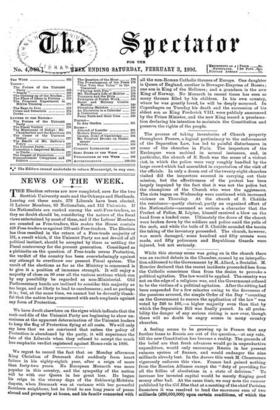A feeling seems to be growing up in France that
any further loans to Russia are out of the question,—at any rate, till the new Constitution has become a reality. The grounds of the belief are that fresh advances would go in unproductive expenditure, would only encourage Russia in her present ruinous system of finance, and would endanger the nine milliards already lent. In the Aurore this week M. Clemenceau vigorously enforces this view. France had gained nothing from the Russian Alliance except the "duty of providing for all the follies of absolutism in a state of delirium." To increase her invested capital would be merely flinging good money after bad. At the same time, we may note the rumour published by the Gil Bias that at a meeting of the chief Parisian financiers it was resolved to lend the enormous sum of two milliards (B80,000,000) upon certain conditions, of which the
more important are that the Dun= should be assembled at once, that it should be a real Parliament, representing the nation and controlling the finances, and that it should formally recognise the foreign debts of Russia. This story may be untrue, but it points at least to a general intention not to lend any funds which can be used to buttress the autocracy, and to demand for any loans a popular control and guarantee.







































 Previous page
Previous page